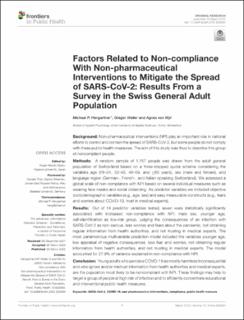Please use this identifier to cite or link to this item:
https://doi.org/10.21256/zhaw-24751Full metadata record
| DC Field | Value | Language |
|---|---|---|
| dc.contributor.author | Hengartner, Michael P. | - |
| dc.contributor.author | Waller, Gregor | - |
| dc.contributor.author | von Wyl, Agnes | - |
| dc.date.accessioned | 2022-03-31T09:44:45Z | - |
| dc.date.available | 2022-03-31T09:44:45Z | - |
| dc.date.issued | 2022-03 | - |
| dc.identifier.issn | 2296-2565 | de_CH |
| dc.identifier.uri | https://digitalcollection.zhaw.ch/handle/11475/24751 | - |
| dc.description.abstract | Background: Non-pharmaceutical interventions (NPI) play an important role in national efforts to control and contain the spread of SARS-CoV-2, but some people do not comply with these public health measures. The aim of this study was thus to describe this group of noncompliant people. Methods: A random sample of 1,157 people was drawn from the adult general population of Switzerland based on a three-stepped quota scheme considering the variables age (18–31, 32–45, 46–59, and ≥60 years), sex (male and female), and language region (German-, French-, and Italian-speaking Switzerland). We assessed a global scale of non-compliance with NPI based on several individual measures such as wearing face masks and social distancing. As predictor variables we included objective sociodemographic variables (e.g., age, sex) and easy measurable constructs (e.g., fears and worries about COVID-19, trust in medical experts). Results: Out of 14 predictor variables tested, seven were statistically significantly associated with increased non-compliance with NPI: male sex, younger age, self-identification as low-risk group, judging the consequences of an infection with SARS-CoV-2 as non-serious, less worries and fears about the pandemic, not obtaining regular information from health authorities, and not trusting in medical experts. The most parsimonious multivariable prediction model included the variables younger age, low appraisal of negative consequences, less fear and worries, not obtaining regular information from health authorities, and not trusting in medical experts. The model accounted for 27.9% of variance explained in non-compliance with NPI. Conclusion: Young adults who perceive COVID-19 as mostly harmless/inconsequential and who ignore and/or mistrust information from health authorities and medical experts, are the population most likely to be noncompliant with NPI. These findings may help to target a group of people at high risk of infection and to efficiently concentrate educational and interventional public health measures. | de_CH |
| dc.language.iso | en | de_CH |
| dc.publisher | Frontiers Research Foundation | de_CH |
| dc.relation.ispartof | Frontiers in Public Health | de_CH |
| dc.rights | http://creativecommons.org/licenses/by/4.0/ | de_CH |
| dc.subject | SARS-CoV-2 | de_CH |
| dc.subject | COVID-19 | de_CH |
| dc.subject | Non-pharmaceutical interventions | de_CH |
| dc.subject | Compliance | de_CH |
| dc.subject | Public health measure | de_CH |
| dc.subject.ddc | 614: Public Health und Gesundheitsförderung | de_CH |
| dc.title | Factors related to non-compliance with non-pharmaceutical interventions to mitigate the spread of SARS-CoV-2 : results from a survey in the Swiss general adult population | de_CH |
| dc.type | Beitrag in wissenschaftlicher Zeitschrift | de_CH |
| dcterms.type | Text | de_CH |
| zhaw.departement | Angewandte Psychologie | de_CH |
| zhaw.organisationalunit | Psychologisches Institut (PI) | de_CH |
| dc.identifier.doi | 10.3389/fpubh.2022.828584 | de_CH |
| dc.identifier.doi | 10.21256/zhaw-24751 | - |
| zhaw.funding.eu | No | de_CH |
| zhaw.issue | 828584 | de_CH |
| zhaw.originated.zhaw | Yes | de_CH |
| zhaw.publication.status | publishedVersion | de_CH |
| zhaw.volume | 10 | de_CH |
| zhaw.publication.review | Peer review (Publikation) | de_CH |
| zhaw.webfeed | Klinische Psychologie | de_CH |
| zhaw.webfeed | Medienpsychologie | de_CH |
| zhaw.author.additional | No | de_CH |
| zhaw.display.portrait | Yes | de_CH |
| zhaw.monitoring.costperiod | 2022 | de_CH |
| Appears in collections: | Publikationen Angewandte Psychologie | |
Files in This Item:
| File | Description | Size | Format | |
|---|---|---|---|---|
| 2022_Hengartner-Waller-vonWyl_Factors-non-compliance-SARS-CoV-2.pdf | 401.82 kB | Adobe PDF |  View/Open |
Show simple item record
Hengartner, M. P., Waller, G., & von Wyl, A. (2022). Factors related to non-compliance with non-pharmaceutical interventions to mitigate the spread of SARS-CoV-2 : results from a survey in the Swiss general adult population. Frontiers in Public Health, 10(828584). https://doi.org/10.3389/fpubh.2022.828584
Hengartner, M.P., Waller, G. and von Wyl, A. (2022) ‘Factors related to non-compliance with non-pharmaceutical interventions to mitigate the spread of SARS-CoV-2 : results from a survey in the Swiss general adult population’, Frontiers in Public Health, 10(828584). Available at: https://doi.org/10.3389/fpubh.2022.828584.
M. P. Hengartner, G. Waller, and A. von Wyl, “Factors related to non-compliance with non-pharmaceutical interventions to mitigate the spread of SARS-CoV-2 : results from a survey in the Swiss general adult population,” Frontiers in Public Health, vol. 10, no. 828584, Mar. 2022, doi: 10.3389/fpubh.2022.828584.
HENGARTNER, Michael P., Gregor WALLER und Agnes VON WYL, 2022. Factors related to non-compliance with non-pharmaceutical interventions to mitigate the spread of SARS-CoV-2 : results from a survey in the Swiss general adult population. Frontiers in Public Health. März 2022. Bd. 10, Nr. 828584. DOI 10.3389/fpubh.2022.828584
Hengartner, Michael P., Gregor Waller, and Agnes von Wyl. 2022. “Factors Related to Non-Compliance with Non-Pharmaceutical Interventions to Mitigate the Spread of SARS-CoV-2 : Results from a Survey in the Swiss General Adult Population.” Frontiers in Public Health 10 (828584). https://doi.org/10.3389/fpubh.2022.828584.
Hengartner, Michael P., et al. “Factors Related to Non-Compliance with Non-Pharmaceutical Interventions to Mitigate the Spread of SARS-CoV-2 : Results from a Survey in the Swiss General Adult Population.” Frontiers in Public Health, vol. 10, no. 828584, Mar. 2022, https://doi.org/10.3389/fpubh.2022.828584.
Items in DSpace are protected by copyright, with all rights reserved, unless otherwise indicated.